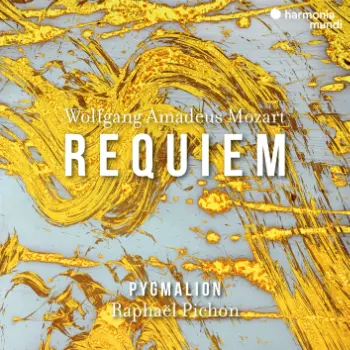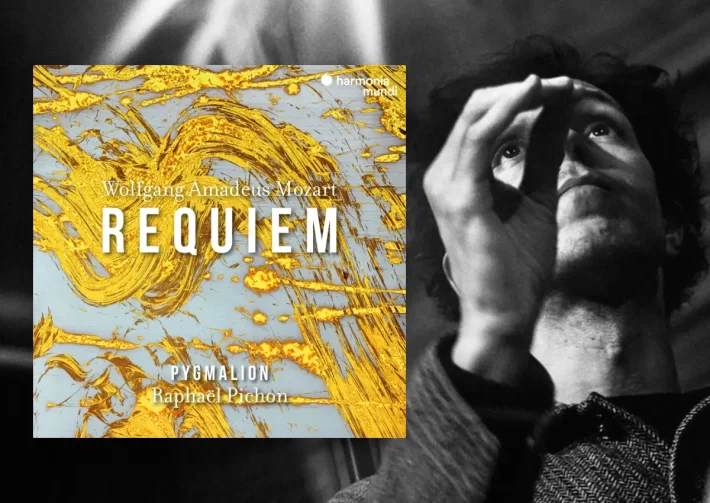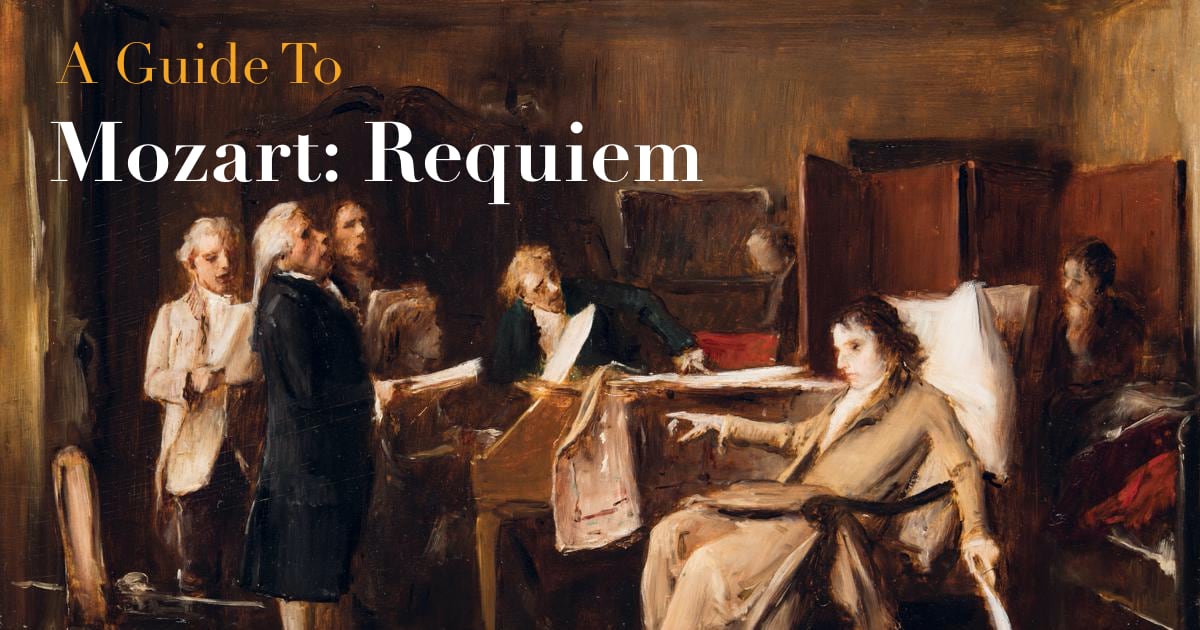I have enjoyed the Bach recordings of these performers, especially their St. Matthew Passion. Yet I approached this latest release, featuring a performance of Mozart’s Requiem (using Süssmayr’s completion) interweaved with works from Mozart’s youth, with some trepidation. Does Mozart’s Requiem really need this “concept” approach? Any such concerns were quickly refuted by the excellence of the performances, and a thoughtful juxtaposition of music that demonstrates that the fully flowered genius of Mozart’s late music can be found in some of his earliest works.
Treble Chadi Lazreq’s gentle intonation of the “In Paradisum” chant opens the program, until it is suddenly cut off by Mozart’s canon “Ach zu kurz ist unsers Lebens Lauf” (‘Alas, too short is the course of our life!’), sung by the four soloists. The Requiem’s Introit/Kyire follow, winds (well forward in the mix) summoning a particularly morose atmosphere. The choir singing is exemplary: full-throated and lyric by turn, with incisive diction (Germanized Latin) and text stress. Pichon’s tempo for the Kyrie is urgent and impassioned.
Bass Alex Ross and choir make the first interpolation, “Ne pulvis et cinis” (‘Do not behave arrogantly, you who are dust and ashes’) intensely dramatic, leading naturally into the opening portion of the Sequence (Dies irae – Rex tremendae). Having heard Ross in “Ne pulvis” does lessen the impact of his “Tuba mirum” pronouncement, and Pichon’s decision to speed up for the tenor’s “Mors stupebit” is unconvincing.
Lazreq returns in the Solfeggio, K.393, which eventually became the soprano solo in the Kyrie of the Great C-Minor Mass. The remainder of the Sequence follows. Despite the sensitivity and beauty of the solo quartet’s singing, the Recordare loses some profundity at this quick tempo, and the winds forward placement only highlight’s Süssmayr’s over orchestration of this movement. But Confutatis is thrilling, contrasting the men’s urgent pleas for mercy with the women’s gentle bliss at acceptance into heaven.
The choir’s singing in Lacrimosa is hushed and awe-struck, ending with Süssmayr’s completion (the perfunctory ‘Amen’). It is immediately followed by a performance of the ‘Amen’ sketch that Mozart began for this movement but never finished. The listener is left to ponder all that was lost when Mozart died, aged 35.
The tempo of Domine Jesu Christe results in a loss of string clarity, though the power and precision of the singing is simply thrilling. An uncredited choral arrangement of the Adagio from the Grand Wind Partita, setting “Quis te comprehendat” (‘Who can comprehend thy greatness, O Most High’), prefaces a sweetly sung “Hostias.” A particularly thoughtful juxtaposition of texts.
Even these performers cannot disguise Süssmayr’s poor orchestral writing in the Sanctus, and the disappointingly realized Hosanna fugue that follows, but the quartet’s singing of the Benedictus is particularly touching. A reading of the first of Mozart’s Kirchenlieder, K. 343: O Gottes Lamm follows. The singing of Beth Taylor (alto) and the choir fully captures the music’s earnest simplicity.
The Agnus Dei and Communio are beautifully sung, conveying both the need for mercy and the assurance of eternal light. I wanted the program to end there, but treble Chadi Lazreq returns to offer a complete rendition of the “In Paradisum” and I found myself deeply touched by this gentle ending.
Join The Classical Newsletter
Get weekly updates from The Classic Review delivered straight to your inbox.
Despite concerns over tempi, this is an exceptionally dramatic and spiritual performance. Pichon’s liner notes are excellent, though I would argue against his defense of the Süssmayr completion. There are now over two dozen other completions, many of which are more idiomatically Mozartian.
And if the argument is to use the work of someone who knew and worked with Mozart, then we should embrace the first orchestration of the Sequence, done by Josef Eybler, a composer we know Mozart admired. This is surely less of an issue for most listeners than it is for me. In any case, the program offers us a thoughtful and deeply considered way to engage and understand Mozart’s last unfinished masterpiece.

Recommended Comparisons
Harnoncourt | Marriner | Gardiner | Savall
Mozart – Requiem
Ying Fang – Soprano
Beth Taylor – Alto
Laurence Kilsby – Tenor
Alex Rosen – Bass
Chadi Lazreq – Treble
Pygmalion
Raphaël Pichon – Conductor

Check offers of this album on Amazon.
Album Details |
|
|---|---|
| Album name | Mozart – Requiem |
| Label | Harmonia Mundi |
| Catalogue No. | 902729 |
| Amazon Music link | Stream here |
| Apple Music link | Stream here |


















